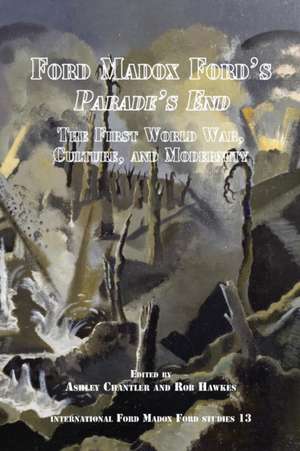Ford Madox Ford’s <i>Parade’s End</i>: The First World War, Culture, and Modernity: International Ford Madox Ford Studies, cartea 13
Ashley Chantler, Rob Hawkesen Limba Engleză Paperback – 31 dec 2013
Ford is best-known for his fiction, especially The Good Soldier, long considered a modernist masterpiece; and Parade’s End, which Anthony Burgess described as ‘the finest novel about the First World War’, Samuel Hynes has called ‘the greatest war novel ever written by an Englishman’, and which was adapted by Tom Stoppard for the acclaimed 2012 BBC/HBO television series, starring Benedict Cumberbatch and Rebecca Hall.
Parade’s End is the subject of the fifteen essays here, by both established experts and new scholars. The volume includes groundbreaking work on the psycho-geography of the war in Ford’s novels; on how the war intensifies self-consciousness about performance and sensation; and on the other writers and artists Ford drew upon, and argued with, in producing his post-war masterpiece.
Preț: 368.51 lei
Nou
Puncte Express: 553
Preț estimativ în valută:
70.52€ • 73.36$ • 58.22£
70.52€ • 73.36$ • 58.22£
Carte indisponibilă temporar
Doresc să fiu notificat când acest titlu va fi disponibil:
Se trimite...
Preluare comenzi: 021 569.72.76
Specificații
ISBN-13: 9789042038639
ISBN-10: 9042038632
Pagini: 232
Dimensiuni: 155 x 235 x 13 mm
Greutate: 0.36 kg
Editura: Brill
Colecția Brill
Seria International Ford Madox Ford Studies
ISBN-10: 9042038632
Pagini: 232
Dimensiuni: 155 x 235 x 13 mm
Greutate: 0.36 kg
Editura: Brill
Colecția Brill
Seria International Ford Madox Ford Studies
Cuprins
Max Saunders: General Editor’s Preface
Rob Hawkes: Introduction
Section 1: Sound, Silence, and Performance
John Attridge: ‘A Taboo on the Mention of Taboo’: Taciturnity and Englishness in Parade’s End and André Maurois’ Les Silences du Colonel Bramble
Sara Haslam: From Conversation to Humiliation: Parade’s End and the Eighteenth Century
Tom Vandevelde: ‘Are You Going to Mind the Noise?’: Mapping the Soundscape of Parade’s End
Angus Wrenn: Wagner’s Ring Cycle and Parade’s End
John B. Murphy: ‘The ’ind Legs of the Elephink’: Pantomime, Prophecy, and Tosh in Parade’s End
Section 2: Psycho-Geography of War
Michael Charlesworth: Panorama, the Map, and the Divided Self: No Enemy, No More Parades, and Tolkien’s The Lord of the Rings
Elizabeth Hodges: Sight and Scale in Parade’s End
Seamus O’Malley: How Much Mud Does a Man Need? Land and Liquidity in Parade’s End
Paul Skinner: Tietjens Walking, Ford Talking
Adam Piette: War and Division in Parade’s End
Section 3: Contrasts: Love, Death, and Alterity
Rob Spence: Ford and Lewis: The Attraction of Opposites
Austin Riede: ‘Cleaned, Sand-Dried Bones’: Christopher Tietjens and the Labour of War
Isabelle Brasme: Articulations of Femininity in Parade’s End
Alec Marsh: ‘Better Far’: Ford and Rossettian Attitudes
Joseph Wiesenfarth: Death in the Wasteland: Ford, Wells, and Waugh
Contributors
Abstracts
Other Volumes in the Series
The Ford Madox Ford Society
Rob Hawkes: Introduction
Section 1: Sound, Silence, and Performance
John Attridge: ‘A Taboo on the Mention of Taboo’: Taciturnity and Englishness in Parade’s End and André Maurois’ Les Silences du Colonel Bramble
Sara Haslam: From Conversation to Humiliation: Parade’s End and the Eighteenth Century
Tom Vandevelde: ‘Are You Going to Mind the Noise?’: Mapping the Soundscape of Parade’s End
Angus Wrenn: Wagner’s Ring Cycle and Parade’s End
John B. Murphy: ‘The ’ind Legs of the Elephink’: Pantomime, Prophecy, and Tosh in Parade’s End
Section 2: Psycho-Geography of War
Michael Charlesworth: Panorama, the Map, and the Divided Self: No Enemy, No More Parades, and Tolkien’s The Lord of the Rings
Elizabeth Hodges: Sight and Scale in Parade’s End
Seamus O’Malley: How Much Mud Does a Man Need? Land and Liquidity in Parade’s End
Paul Skinner: Tietjens Walking, Ford Talking
Adam Piette: War and Division in Parade’s End
Section 3: Contrasts: Love, Death, and Alterity
Rob Spence: Ford and Lewis: The Attraction of Opposites
Austin Riede: ‘Cleaned, Sand-Dried Bones’: Christopher Tietjens and the Labour of War
Isabelle Brasme: Articulations of Femininity in Parade’s End
Alec Marsh: ‘Better Far’: Ford and Rossettian Attitudes
Joseph Wiesenfarth: Death in the Wasteland: Ford, Wells, and Waugh
Contributors
Abstracts
Other Volumes in the Series
The Ford Madox Ford Society






